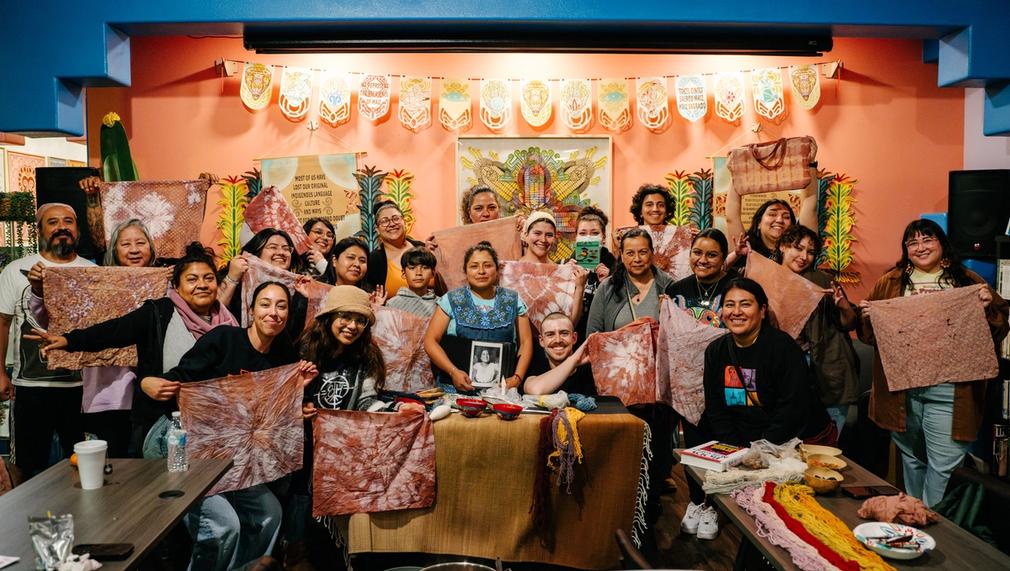Indigenous in Us
“Indigenous in Us” is a culturally rooted program that uplifts Mesoamerican Indigenous knowledge, healing and community safety through workshops, ceremonies and the arts. With funding from LA2050, Tia Chucha’s will launch a new initiative under our existing “Indigenous in Us” program, utilizing ancestral practices to promote wellness, connection and belonging in the Northeast San Fernando Valley (NSFV) — fostering a model for collective care and safety across Los Angeles.

What is the primary issue area that your application will impact?
Community safety
In which areas of Los Angeles will you be directly working?
San Fernando Valley
In what stage of innovation is this project, program, or initiative?
Expand existing project, program, or initiative (expanding and continuing ongoing, successful work)
What is your understanding of the issue that you are seeking to address?
Community safety is not just about physical protection — and requires more than policing or shelter. Through decades of work with Latinx, Indigenous, immigrant and refugee populations, we know that safety is rooted in, and grows, when people feel a genuine sense of cultural belonging, experience meaningful support and engage in healing practices.
For example, our program participants consistently report feeling more hopeful, connected and grounded — all of which are critical factors that prevent isolation and reduce harm. National research shows that the presence of cultural resources like ours is associated with improved community security and wellbeing, leading to an 18% decrease in serious crime (University of Pennsylvania, 2017).
In the face of heightened anti-immigrant rhetoric and I.C.E. raids, many in our community are afraid of how their families will be impacted. These conditions deepen trauma and disconnection — making spaces for healing and solidarity more vital than ever.
Describe the project, program, or initiative this grant will support to address the issue.
Building on the strong foundation of our “Indigenous in Us” program, we propose an innovative expansion focused explicitly on community safety — emphasizing emotional safety, belonging and support systems for marginalized communities. This program will engage youth, adults and elders through a series of free public workshops centered on Indigenous Native Mexica and Central American arts, healing practices and cultural traditions. This iteration will specifically deepen participants’ access to ancestral wellness practices as tools for preventing harm, promoting healing from trauma and building inclusive community networks.
The new program will include multiple series-based workshops to help participants get more integrated into the knowledge and practice. Themes can include Mexica Dance, Song, and/or drumming, herbal remedies for daily use, Mesoamerican cosmology and Mexica calendar counts. We anticipate the series will range from four to eight weeks, with sessions once a week (depending on the topic). We also anticipate facilitating one-time workshops to promote broader accessibility, as well as a full-day mesoamerican healing retreat for the community to experience first-hand teachings, healing and methods with local and healers from Mexico.
Through this expansion, “Indigenous in Us” will serve as a vital space where participants build knowledge, support and cultural pride — key protective factors that actively contribute to safer, stronger communities.
Describe how Los Angeles County will be different if your work is successful.
If successful, our work will directly strengthen community safety in Los Angeles County by creating accessible spaces where NSFV residents can engage in culturally specific healing arts and ancestral practices. This immediate impact will build resilience, foster belonging and reduce harm by actively promoting inclusion and support systems tailored to the unique experiences of our local community.
Beyond this, we believe the program’s model could be scaled and adapted across Los Angeles County, with programming customized to reflect each community’s unique cultural traditions and strengths. If successful, the NSFV will have established a replicable framework that other regions can adapt to combat isolation and foster community safety through cultural resources. By expanding these culturally-responsive pathways to resilience, we can empower more Angelenos to cultivate supportive networks and a shared sense of wellbeing.
Approximately how many people will be impacted by this project, program, or initiative?
Direct Impact: 300
Indirect Impact: 1,500